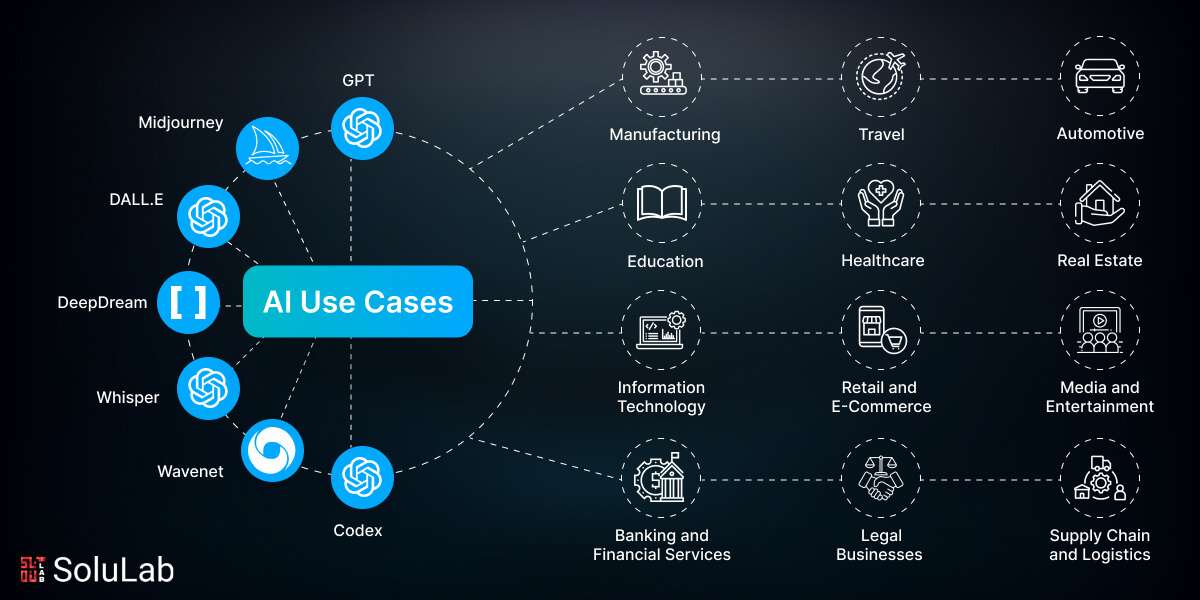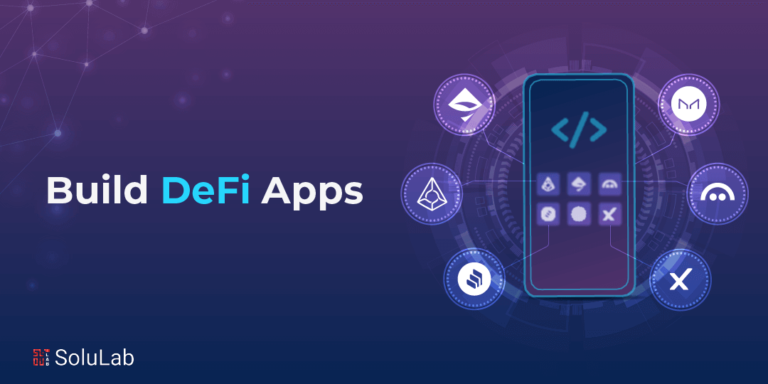
Artificial intelligence is becoming more and more popular every day. The power of software or systems to reason and gain knowledge from experience is known as artificial intelligence. Over the past several years, applications of AI have advanced dramatically and are now used in practically every industry. Artificial intelligence for industrial applications AI is particularly transformative, optimizing processes, enhancing productivity, and providing real-time insights for better decision-making.
Organizations frequently require assistance in addressing issues such as an abundance of data, erratic decision-making, inefficient resource allocation, and the requirement for instantaneous insights. These problems can slow down growth, reduce productivity, and undermine an organization’s ability to succeed as a whole. However, the use of AI lessens these difficulties and drives companies to previously unheard-of heights of performance. To fully leverage these advantages, it’s essential to understand how many application of AI are there and implement them strategically across various business operations.
AI is a crucial ally in this age of digital acceleration, with specific use cases available for all major businesses. AI’s revolutionary influence is changing conventional paradigms in a variety of industries, including manufacturing, retail, healthcare, and finance. Businesses may use artificial intelligence (AI) to improve resource efficiency, get insights into customer behavior and market trends, and simplify operations by utilizing machine learning (ML), predictive analytics, and sophisticated automation. Grand View Research projects that the worldwide AI market will grow at a 38.1% CAGR to reach $1,811.8 billion by 2030, from $136.6 billion in 2022.
This article focuses on significant AI-using businesses that have benefited greatly from their use and yet have a ton of room to develop. But first, let’s define artificial intelligence for the purposes of this discussion.
The Function of Artificial Intelligence in Business Management
John McCarthy, an American computer scientist and cognitive researcher, created the phrase artificial intelligence in 1956 and describes it as “the technical and scientific method of making intelligent machines.”
AI is the capacity of a computer or a computer-controlled robot to execute tasks often associated with intelligent entities, most notably humans. As a result, it exhibits tremendous talents like reasoning, finding meaning, and learning from experience.
Artificial intelligence for industrial applications AI revolutionizes company operations by automating jobs, evaluating data, and improving decision-making. AI improves operational efficiency by automating repetitive operations, streamlining supply chains, forecasting maintenance needs, and providing individualized customer experiences. It is critical in decisions based on data support, cybersecurity, and talent acquisition, all of which stimulate industry-wide innovation. AI’s ongoing learning capabilities enable adaptation to changing business landscapes, solidifying its position as a revolutionary force in attaining increased productivity, cost savings, and a competitive advantage for enterprises managing the complexity of today’s business environment. Companies must identify current business uses and application of AI to fully leverage its potential.
AI Use Cases in Different Industries
Let’s take a look at some of the AI use cases by industry.
Healthcare
The use cases of AI in healthcare include:
- Medical Imaging: Artificial intelligence analyzes X-rays and CT scans with greater speed and accuracy, making it easier to diagnose illnesses such as pneumonia and TB. The use cases of AI in healthcare help to detect lung nodules, reduce the likelihood of missing malignant growths, and detect osteoporosis in X-rays.
- Personalized Therapy: Artificial intelligence uses patient data, genetic information, and lifestyle variables to identify illness risks and customize treatment strategies. Future of AI in healthcare industry helps to pick the best chemotherapy treatments based on genetic profiles and remotely monitor patients, identifying early indicators of illnesses such as heart disease and diabetes.
- Electronic Health Records (EHRs): AI analyzes electronic health records (EHRs) to find patterns and trends, anticipate illness risks, and implement individualized preventative efforts. It studies medical history, lifestyle, and genetic information to predict risks like diabetes or heart disease, as well as trends in prescription data to prevent hazardous drug responses.
Related: AI Agents in Healthcare
Retail and E-Commerce
AI use cases in retail and e-commerce comprise of:
- Personalized Shopping Experience: AI analyzes user behavior, preferences, and previous purchases to provide personalized product recommendations based on individual insights. This improves the browsing experience, increases client engagement, and promotes revenue by providing goods that are personalized to individual preferences.
- Dynamic Price Optimization: Retailers utilize AI algorithms to monitor real-time market circumstances, rival pricing, and client demand. Artificial intelligence use cases in e-commerce allow for dynamic pricing modifications, assuring appropriate pricing strategies for remaining competitive, maximizing earnings, and efficiently responding to market variations.
- Chatbots for Customer Service: AI-powered chatbots are used to manage client inquiries, give immediate assistance, and help in order tracking. By providing timely replies, these virtual assistants help to improve customer service and build a favorable company image as a part of AI in retail use cases.
Read Also: How Generative AI is Transforming the E-Commerce Industry?
Food Technology
AI in the food industry has several use cases, such as:
- Supply Chain Optimization: Artificial intelligence improves the food supply chain by anticipating demand, controlling inventories, and streamlining logistics. This reduces waste, ensures timely delivery, and improves efficiency in transferring food from fields to customers.
- Quality Control and Inspection: AI-powered technologies are used in food processing to ensure quality. Computer vision algorithms may identify flaws, contamination, or anomalies in food goods, ensuring that only high-quality commodities reach the marketplace.
- Menu Modification in Restaurants: AI is used in the restaurant business to adapt menus based on client preferences, dietary restrictions, and past ordering history. This improves the eating experience, boosts consumer pleasure, and enables businesses to provide specialized meal selections.
Banking and Financial Services
AI in banking and finance use cases include the following:
- Fraud Detection and Prevention: Artificial intelligence is used in banking and finance to detect fraud in real time by studying transaction patterns, recognizing abnormalities, and reporting possibly fraudulent activity. Machine learning algorithms respond to changing fraud tendencies, improving the security of financial transactions.
- Credit Scoring and Risk Assessment: AI-powered credit scoring uses other sources of information and ML algorithms to improve the accuracy of creditworthiness assessments for individuals and enterprises. This results in improved risk management, allowing financial institutions to make educated lending decisions.
- Anti-Money Laundering (AML) Compliance: AI is used to improve AML compliance by simplifying the examination of massive volumes of transaction data.
Supply Chain and Logistics
AI in logistics and supply chain use cases include:
- Management of Warehouse Layout and Space Utilization: By evaluating data on demand for goods and inventory levels, AI-driven logistics management improves warehouse operating efficiency. AI makes the most use of available space by cleverly reorganizing shelves and racks to accommodate a variety of item sizes and storage requirements.
- Tracking and Monitoring Shipments: AI enables effective real-time tracking and monitoring of shipments, providing prompt notifications for any delays or problems. Innovative algorithms examine shipping data to anticipate possible issues and facilitate preventative action.
- Resource Management: AI improves resource management by distributing tasks among human workers as efficiently as possible by evaluating workload data, such as order quantities and processing times. This guarantees that tasks correspond with workers’ abilities and availability, minimizing bottlenecks and improving overall productivity.
Travel
Applications of AI in the travel industry include:
- Personalized Itineraries: Artificial intelligence allows travel businesses to develop customized itineraries based on individual interests. AI is a smart travel adviser who curates optimal experiences personalized to each traveler based on their money, time limits, and social media interests.
- Real-time Travel Updates and Suggestions: Artificial intelligence enables travel businesses to provide real-time information and tailored recommendations based on location and interests. As a virtual tour guide, AI in travel recommends hidden gems such as quiet cafés, lesser-known art galleries, and breathtaking vistas, enriching the vacation experience with unique insights.
- Booking Assistance: AI-powered chatbots help passengers with inquiries during the booking procedure. These chatbots offer prompt and exact assistance, providing price information, assisting passengers in comparing choices, and allowing them to make well-informed selections based on their tastes, schedules, and budgets.
Real Estate
The use cases of AI in real estate include:
- Automated Property Valuation: AI algorithms use historical data, local market circumstances, and property qualities to assess how much real estate is worth. This impartial technique eliminates subjective biases, resulting in accurate appraisals for buyers, sellers, lenders, and investors.
- Portfolio Optimization in Real Estate Investment: AI uses machine learning to examine large datasets and forecast property prices, rental revenue, and market volatility. AI-powered risk assessment algorithms generate diverse portfolios by monitoring market volatility and economic indicators and then optimizing the risk-reward balance via dynamic changes and real-time data processing.
- Automatic Lead Generation: Artificial intelligence in real estate simplifies and enhances the identification of possible prospects. Machine learning algorithms use varied datasets to identify prospects based on demographics, internet activity, and property preferences. AI uses predictive analytics to forecast the possibility of lead conversion, allowing agents to set priorities for high-potential leads and manage resources more efficiently, resulting in faster procedures and higher conversion rates.
Media and Entertainment
AI in media and entertainment has the following uses:
- AI-powered Music Recommendation Systems: It creates personalized profiles based on user data such as listening history and preferences. These profiles are used to make individualized suggestions that take into account genre, mood, artist, and pace. Platforms such as Spotify utilize AI algorithms to study user activity and build tailored playlists for a better music discovery experience.
- AI in Game Design and Play: AI raises game design by enhancing non-player characters (NPCs) and refining mechanisms, resulting in realistic and demanding levels that improve the player’s experience. What industries use artificial intelligence? In the gaming industry, AI provides difficult opponents with greater immersion in gameplay and develops generating material, such as new stages and characters, to ensure a continually fresh and exciting gaming experience.
- Editing Movies: Artificial intelligence is essential for making effective movie trailers and editing full-length films. AI excels at finding high-impact emotionally charged situations, which helps editors create captivating trailers. Furthermore, AI is useful in editing complete films, using face recognition to identify significant actors and essential plot-related moments, hence speeding the editing process for feature-length projects.
Manufacturing
The applications of AI in manufacturing involves:
- Defect Detection: AI improves defect detection in production by adding self-learning capabilities into existing systems, reducing false alarms and tedious manual inspections. This incorporation of artificial intelligence helps manufacturers to increase productivity, eliminate manual interventions, and improve overall product quality.
- Assembly Line Integration: AI-automated assembly lines simplify operations in contemporary manufacturing, reducing the need for human involvement while assuring efficient, consistent, and error-free output. This automation boosts efficiency, decreases mistakes, and increases total production by allowing machines to do activities in a predetermined order.
- Predictive Analytics: By evaluating sensor data and maintenance records, AI systems may forecast equipment breakdowns and schedule repair tasks in advance. This predictive strategy avoids unwanted downtime and lowers maintenance expenses.
Read Blog: 10 Benefits of Incorporating Generative AI in the Manufacturing Process
Automotive
The applications of AI in automotive are:
- Intelligent Traffic Management: It uses artificial intelligence to evaluate real-time traffic data from GPS and Security Cameras. AI systems use this data to optimize traffic flow, reduce congestion, and increase road safety. Adaptive traffic signal control systems automatically modify signal timings in response to real-time traffic circumstances, reducing bottlenecks. Dynamic route planning suggests alternate routes to drivers, minimizing travel time. Furthermore, AI-driven accident detection systems identify accidents quickly, allowing for timely reactions and effective rerouting.
- Enhanced Navigation: AI-powered navigation goes beyond typical GPS to provide optimum routes by using real-time data such as traffic, weather, and road conditions. These adaptive algorithms automatically change routes to avoid congestion and accidents, giving drivers more efficient routes.
- Personalized Customer Experience: AI creates individualized consumer experiences in the automobile sector by adapting conversations and services to individual preferences. AI systems analyze data such as previous purchases and driving behaviors to produce tailored suggestions for car features and maintenance schedules. This increases consumer involvement, loyalty, and satisfaction. Furthermore, AI-powered chatbots offer quick support, guiding clients through tasks such as purchasing or troubleshooting, resulting in a smooth and customized experience.
Education
AI has favorably influenced the education business by transforming learning methods and providing several applications AI cases. Here are some of the cases:
- Personalized Learning: AI adapts information and learning routes to each student’s specific requirements, increasing engagement and improving learning results. This strategy guarantees that students get focused and adaptable educational experiences.
- Intelligent Tutoring: AI-driven tutoring systems provide tailored assistance and feedback to students, improving their learning experience. These AI in education systems cater to individual learning methods, offering focused support and improving comprehension in a variety of areas.
- Learning Analytics: AI investigates learning analytics by evaluating student performance data to identify patterns and trends. Educators may use these insights to develop data-driven interventions, highlight areas for growth, and provide individualized assistance to increase overall student achievement.
Fashion
The applications of AI in fashion are:
- Trend Predicting and Purchasing: AI is critical in the fashion business, using data from a variety of sources to forecast trends. By analyzing consumer behavior and preferences through social media, previous sales information, and fashion blogs, AI algorithms enable intelligent purchase decisions. This guarantees that fashion companies fit their collections with current and new trends, increasing their market relevance.
- Design and Product Development: AI technologies are incorporated into the design and development process to provide design recommendations, optimize patterns for material efficiency, and generate virtual prototypes. AI in fashion speeds the creative process, allowing designers to experiment with different materials, designs, and colors. The consequence is more efficient design iterations and improved product development in the fashion sector.
- Style and Visual Merchandising: Artificial intelligence improves visual merchandising by suggesting style options based on consumer preferences and fashion trends. Whether at a real shop or online, AI recommends product pairings and outfit ideas, as well as virtual try-ons. This tailored strategy engages clients by providing an engaging and visually appealing buying experience.
Information Technology
AI in information technology includes the following use cases:
- IT Support and Helpdesk Automation: AI-powered chatbots and virtual assistants improve IT assistance by effectively managing user questions and technical challenges, such as password resets and complex device installations. This automation increases customer pleasure, frees up IT personnel to focus on strategic objectives, and gives useful data for improving IT service delivery operations.
- Cybersecurity and Threat Detection: Artificial intelligence continually analyzes network traffic and user activity, detecting irregularities and possible security issues. Automated incident response activities and proactive threat mitigation help to build a strong cybersecurity posture, decreasing reaction times and protecting sensitive data from cyber-attacks.
- IT Asset Management: AI enables effective IT asset management by automating asset detection, tracking usage trends, and anticipating maintenance requirements. It helps in maintaining an up-to-date inventory while also assuring compliance with license agreements and regulatory regulations. AI-driven asset management enhances IT services, reduces expenditures on procurement, and better allocates resources.
Legal Businesses
Applications of AI in legal business include:
- Contract Analysis: Artificial intelligence in business simplifies contract analysis by optimizing the evaluation and extraction of relevant provisions, decreasing manual work, and increasing efficiency in legal document scrutiny.
- Legal Research: AI assists legal study by evaluating voluminous legal texts, case law, and precedents. This speeds up the research process, giving legal practitioners useful insights and allowing for better-informed decision-making.
- E-discovery: In legal procedures, AI algorithms make e-discovery easier by effectively evaluating and classifying enormous amounts of electronic documents, emails, and digital evidence, ensuring a full investigation of digital materials.
Read Our Blog: AI Agents in Legal Industry
Hospitality
AI assists hospitality firms in several ways:
- Personalized Suggestions: AI algorithms may assess client preferences, prior bookings, and previous searches to make specific suggestions for hotels, eating options, and activities, therefore improving the entire guest experience.
- Revenue Management: Artificial intelligence can assess market trends, historical data, and patterns of demand to help hotels and resorts improve pricing strategies, enhance occupancy rates, and boost revenue.
- Guest Sentiment Analysis: AI in hospitality algorithms may gather sentiment from customer reviews, social media comments, and feedback to detect areas for advancement, permitting businesses to increase visitor happiness and respond to any problems quickly.
Conclusion
As AI advances to the next level, it increasingly emerges as the most powerful driving factor for a technological revolution. AI promotes efficiency in industries such as healthcare, retail, finance, logistics, entertainment, and manufacturing, enabling decision-making and improving consumer experiences for enterprises. The application of AI spans across sectors, opening up a world of endless possibilities. What we have seen and may imagine only touches the surface of AI’s vast possibilities, underscoring its critical role in redefining the landscape of technological breakthroughs. We are living in an era in which robots are learning to comprehend and predict what humans desire or are likely to do in the future.
As an AI development company, SoluLab stands ready to meet your needs for innovative solutions by offering a team of highly skilled AI developers. Whether you’re looking to hire AI developers for advanced machine learning algorithms, natural language processing systems, or intelligent automation, we provide unparalleled expertise to drive your business forward. With a commitment to crafting customized solutions tailored to your specific requirements, SoluLab ensures that you stay ahead of the curve in the rapidly evolving landscape of artificial intelligence. Elevate your operations, enhance customer experiences, and unlock new opportunities with our dedicated team. Contact us today to hire AI developers and embark on your journey towards AI-driven success.
FAQs
1. What are some common artificial intelligence use cases and applications in 2025?
In 2025, AI is omnipresent across various industries. Common use cases include personalized healthcare diagnostics and treatment planning, predictive maintenance in manufacturing, AI-driven cybersecurity for threat detection and response, autonomous vehicles for transportation and logistics, and AI-powered virtual assistants enhancing customer service across multiple sectors.
2. How does AI benefit the healthcare industry in 2025?
AI will revolutionize healthcare in 2025 by enabling personalized treatment plans through predictive analytics, improving diagnostic accuracy with advanced imaging analysis, streamlining administrative tasks with AI-driven chatbots, and facilitating remote patient monitoring through wearable devices and telemedicine solutions.
3. What role does AI play in enhancing cybersecurity in 2025?
AI serves as a crucial tool in bolstering cybersecurity defenses in 2025. Its applications include threat detection and response, anomaly detection in network traffic, behavior analysis to identify malicious activities, and predictive modeling to anticipate future cyber threats, thus enabling proactive defense measures.
4. How is AI transforming the manufacturing sector in 2025?
In 2025, AI will transform manufacturing operations by optimizing production processes through predictive maintenance, enhancing quality control with computer vision and machine learning algorithms, enabling autonomous robotics for tasks such as assembly and material handling, and facilitating demand forecasting and supply chain management.
5. What are some examples of AI applications in daily life in 2025?
AI will permeate daily life in 2025 through various applications such as personalized recommendations in entertainment and e-commerce platforms, smart home devices for automation and convenience, language translation services facilitating global communication, AI-powered virtual assistants for scheduling, reminders, and task management, and intelligent navigation systems for efficient travel and commuting.






